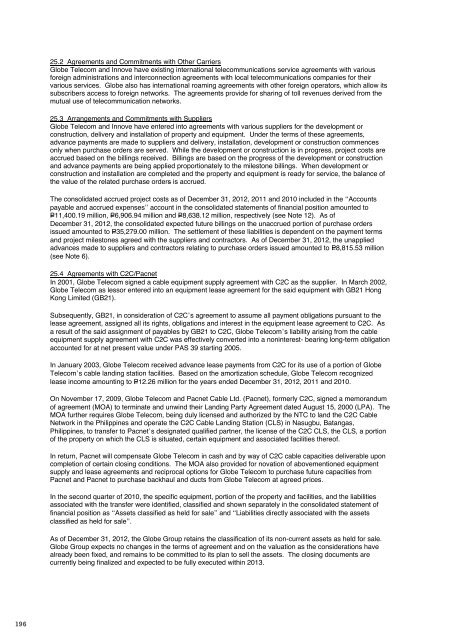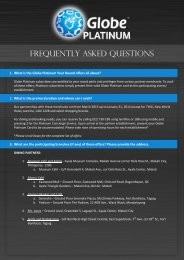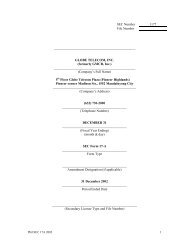here - Ayala
here - Ayala
here - Ayala
You also want an ePaper? Increase the reach of your titles
YUMPU automatically turns print PDFs into web optimized ePapers that Google loves.
Globe 2012 annual report<br />
financial report<br />
25.2 Agreements and Commitments with Other Carriers<br />
Globe Telecom and Innove have existing international telecommunications service agreements with various<br />
foreign administrations and interconnection agreements with local telecommunications companies for their<br />
various services. Globe also has international roaming agreements with other foreign operators, which allow its<br />
subscribers access to foreign networks. The agreements provide for sharing of toll revenues derived from the<br />
mutual use of telecommunication networks.<br />
25.3 Arrangements and Commitments with Suppliers<br />
Globe Telecom and Innove have entered into agreements with various suppliers for the development or<br />
construction, delivery and installation of property and equipment. Under the terms of these agreements,<br />
advance payments are made to suppliers and delivery, installation, development or construction commences<br />
only when purchase orders are served. While the development or construction is in progress, project costs are<br />
accrued based on the billings received. Billings are based on the progress of the development or construction<br />
and advance payments are being applied proportionately to the milestone billings. When development or<br />
construction and installation are completed and the property and equipment is ready for service, the balance of<br />
the value of the related purchase orders is accrued.<br />
The consolidated accrued project costs as of December 31, 2012, 2011 and 2010 included in the “Accounts<br />
payable and accrued expenses” account in the consolidated statements of financial position amounted to<br />
P=11,400.19 million, P=6,906.94 million and P=8,638.12 million, respectively (see Note 12). As of<br />
December 31, 2012, the consolidated expected future billings on the unaccrued portion of purchase orders<br />
issued amounted to P=35,279.00 million. The settlement of these liabilities is dependent on the payment terms<br />
and project milestones agreed with the suppliers and contractors. As of December 31, 2012, the unapplied<br />
advances made to suppliers and contractors relating to purchase orders issued amounted to P=8,815.53 million<br />
(see Note 6).<br />
25.4 Agreements with C2C/Pacnet<br />
In 2001, Globe Telecom signed a cable equipment supply agreement with C2C as the supplier. In March 2002,<br />
Globe Telecom as lessor entered into an equipment lease agreement for the said equipment with GB21 Hong<br />
Kong Limited (GB21).<br />
Subsequently, GB21, in consideration of C2C’s agreement to assume all payment obligations pursuant to the<br />
lease agreement, assigned all its rights, obligations and interest in the equipment lease agreement to C2C. As<br />
a result of the said assignment of payables by GB21 to C2C, Globe Telecom’s liability arising from the cable<br />
equipment supply agreement with C2C was effectively converted into a noninterest- bearing long-term obligation<br />
accounted for at net present value under PAS 39 starting 2005.<br />
In January 2003, Globe Telecom received advance lease payments from C2C for its use of a portion of Globe<br />
Telecom’s cable landing station facilities. Based on the amortization schedule, Globe Telecom recognized<br />
lease income amounting to P=12.26 million for the years ended December 31, 2012, 2011 and 2010.<br />
On November 17, 2009, Globe Telecom and Pacnet Cable Ltd. (Pacnet), formerly C2C, signed a memorandum<br />
of agreement (MOA) to terminate and unwind their Landing Party Agreement dated August 15, 2000 (LPA). The<br />
MOA further requires Globe Telecom, being duly licensed and authorized by the NTC to land the C2C Cable<br />
Network in the Philippines and operate the C2C Cable Landing Station (CLS) in Nasugbu, Batangas,<br />
Philippines, to transfer to Pacnet’s designated qualified partner, the license of the C2C CLS, the CLS, a portion<br />
of the property on which the CLS is situated, certain equipment and associated facilities t<strong>here</strong>of.<br />
In return, Pacnet will compensate Globe Telecom in cash and by way of C2C cable capacities deliverable upon<br />
completion of certain closing conditions. The MOA also provided for novation of abovementioned equipment<br />
supply and lease agreements and reciprocal options for Globe Telecom to purchase future capacities from<br />
Pacnet and Pacnet to purchase backhaul and ducts from Globe Telecom at agreed prices.<br />
In the second quarter of 2010, the specific equipment, portion of the property and facilities, and the liabilities<br />
associated with the transfer were identified, classified and shown separately in the consolidated statement of<br />
financial position as “Assets classified as held for sale” and “Liabilities directly associated with the assets<br />
classified as held for sale”.<br />
As of December 31, 2012, the Globe Group retains the classification of its non-current assets as held for sale.<br />
Globe Group expects no changes in the terms of agreement and on the valuation as the considerations have<br />
already been fixed, and remains to be committed to its plan to sell the assets. The closing documents are<br />
currently being finalized and expected to be fully executed within 2013.<br />
As of December 31, 2012, 2011 and 2010, assets classified as held for sale amounted to P=778.32 million. As of<br />
December 31, 2012, 2011 and 2010, liabilities directly associated with assets classified as held for sale<br />
amounted to P=459.76 million, P=583.37 million and P=697.73 million, respectively.<br />
25.5 Agreement with BHI<br />
On August 11, 2009, Globe Telecom signed a credit facility agreement with BHI amounting to P=750.00 million.<br />
As of December 31, 2012 and 2011, the total drawdown of BHI amounted to P=295.00 million (see Note 11). The<br />
loan is payable in one full payment, five years from the date of initial drawdown, with a prepayment option in<br />
whole or in part on an interest payment date. Interest is at the rate of 8.275%, payable semi-annually in arrears<br />
and the loan is secured by a pledge and chattel mortgage agreement. As of December 31, 2012, 2011 and<br />
2010, the undrawn balance of the credit facility is P=455.00 million. Interest income amounted to P=24.82 million,<br />
P=24.75 million and P=25.76 million in 2012, 2011 and 2010, respectively (see Note 19).<br />
25.6 Agreement with STI<br />
In 2009, STI agreed to sell to Globe Telecom its own capacity in a certain cable system. In 2009 also, Globe<br />
Telecom agreed to sell to STI capacities that it owns in a certain cable system (see Note 16.1). In March 2011,<br />
the final agreements were executed between Globe Telecom and STI w<strong>here</strong>by Globe Telecom conveyed and<br />
transferred ownership of certain IRU of certain international cables systems in exchange for IRUs of certain<br />
cables systems of STI. The assets received were booked at its fair value amounting to P=120.19 million.<br />
25.7 Construction Maintenance Agreement for South-East Asia Japan Cable System (SJC)<br />
In April 2011, the global consortium of telecommunication companies formed to build and operate the South-<br />
East Asia Japan Cable (SJC) system officially started the construction of the project that will link Brunei, China<br />
Mainland, Hong Kong, Philippines, Japan, and Singapore with options to extend to Thailand. The SJC<br />
consortium is composed of Globe Telecom and nine other international carriers. Globe Telecom’s estimated<br />
investment for this project amounts to USD63.60 million and total expenditures incurred was at 74% and 20% as<br />
of December 31, 2012 and 2011, respectively (see Note 7).<br />
25.8 Agreement with BTI<br />
On July 26, 2012, Globe Telecom and BTI executed an agreement to jointly use BTI frequencies for their<br />
respective telecommunications services. Globe Telecom agreed to pay BTI a capacity provision fee per annum<br />
and grant access to each other’s network, resources and facilities to enable joint and efficient use of the<br />
frequency.<br />
On October 1, 2012, the National Telecommunications Commission provisionally approved the joint use by<br />
Globe Telecom and BTI the frequencies assigned to BTI. The joint use agreement will allow Globe Telecom to<br />
address the increasing demand for voice, SMS and mobile data services; and for BTI to be able to offer mobile<br />
telecommunications services nationwide. The Commission imposed conditions to both parties, which includes<br />
the continuous payment of annual spectrum usage fee (SUF) imposed by the Commission to both parties, and<br />
w<strong>here</strong> Globe Telecom shall improve and maintain the required quality service in order to continue the joint use<br />
of the assigned frequencies.<br />
26. Contingencies<br />
On July 23, 2009, the NTC issued NTC Memorandum Circular (MC) No. 05-07-2009 (Guidelines on Unit of<br />
Billing of Mobile Voice Service). The MC provides that the maximum unit of billing for the cellular mobile<br />
telephone service (CMTS) whether postpaid or prepaid shall be six (6) seconds per pulse. The rate for the first<br />
two (2) pulses, or equivalent if lower period per pulse is used, may be higher than the succeeding pulses to<br />
recover the cost of the call set-up. Subscribers may still opt to be billed on a one (1) minute per pulse basis or<br />
to subscribe to unlimited service offerings or any service offerings if they actively and knowingly enroll in the<br />
scheme.<br />
On December 28, 2010, the CA rendered its decision declaring null and void and reversing the decisions of the<br />
NTC in the rates applications cases for having been issued in violation of Globe and the other carrier’s<br />
constitutional and statutory right to due process. However, while the decision is in Globe’s favor, t<strong>here</strong> is a<br />
provision in the decision that NTC did not violate the right of petitioners to due process when it declared via<br />
circular that the per pulse billing scheme shall be the default.<br />
Last January 21, 2011, Globe and two other telecom carriers, filed their respective Motions for Partial<br />
Reconsideration (MR) on the pronouncement that “the Per Pulse Billing Scheme shall be the default”. The MR<br />
is pending resolution as of February 5, 2013.<br />
196 197
















